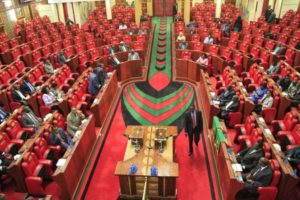I am disappointed that former Cabinet secretary Anne Waiguru — under whose watch nearly a billion shillings of public money is believed to have been misappropriated — still thinks that she has what it takes to be a leader.
Ms Waiguru has stated that she will be running for the governorship of Kirinyaga county. The question I am asking is: If hundreds of millions of shillings from her ministry could have been stolen without her being aware of it, as she claims, then will devolved public funds be safe in her hands?

Unfortunately, the typical Kenyan voter, steeped as he is in tribalism and money-worshipping, does not ask such questions.
Both the government and the opposition are filled with people who are linked to various scandals, including land grabbing, bribe-giving, drug dealing, abuse of authority, or failure to properly manage a public institution.
When these people commit a major blunder while in office, they stay in their jobs and act as if nothing happened. The Cabinet secretary accused of mishandling Kenya’s athletes at the Rio Olympics, for example, has still not seen it fit to resign.
Managers who have run down parastatals or State-owned institutions continue earning huge salaries. The top managers at Kenya Airways, once dubbed “The Pride of Africa”, have not resigned or been forced to vacate their offices even though decisions that they made have resulted in colossal losses and ruined the airline’s reputation.
In countries such as Japan, CEOs and politicians who are found to have embezzled funds have been known to commit suicide out of shame. In Kenya, the very opposite happens.
Businessmen and politicians linked to mega-corruption display no remorse for their actions. Even when they appear in court to face charges, they are usually seen smiling for the cameras instead of hiding their faces in shame. Why is there no such thing as shame in Kenya?
In other more civilised and more ethically-conscious countries, politicians and CEOs resign when they are accused of lesser sins, either because of public pressure or because their conscience does not allow them to continue in the job. Even the whiff of a scandal, such as an adulterous affair, can make such leaders resign.
In some countries, ministers will resign if public money or lives are lost due to negligence, not on their part, but on the part of their juniors. For example, if a State-run ferry sinks due to poor maintenance and people die, the transport minister would ideally resign.
PUBLIC OFFICIALS RESIGN
Not so in Kenya. Even when public officials resign, which rarely happens, they expect a large send-off package, even if the resignations were prompted by corruption allegations, as has happened with the commissioners at the Independent Electoral and Boundaries Commission.
Yet Chapter 6 of the Constitution on leadership and integrity says that a State officer should, through his or her actions, promote public confidence in the integrity of his or her office.
Further, State officers are not expected to engage in nepotism, favouritism, or corrupt practices, nor should they have any conflict between personal interests and official duties.
If their personal opinions and interests clash with what the majority wants, then they should resign, as did David Cameron as prime minister when he failed to prevent Britain leaving the European Union.
Furthermore, the Constitution categorically states that a person who has been dismissed or otherwise removed from office for engaging in corrupt practices is automatically disqualified from holding another State office.
Yet it is precisely these kinds of people who are now lining up to be elected to Parliament, Senate, and county assemblies.
Sometimes I think that they are doing this because they believe that the public office will offer them immunity from prosecution for their crimes. Indeed, given the poor record of prosecution of the “big fish” in corruption scandals, they might be right.
Kenyans have to decide whether the Constitution that they fought so hard for is merely an unattainable aspiration or a living, breathing guide to making leadership honest and accountable to the citizens of this country. We should ensure that the aspirants we vote for in 2017 adhere to Chapter 6, Articles 73 to 79 of the Constitution.
But then maybe that is just wishful thinking. Perhaps it is true what they say — that we get the leaders we deserve.
Source: DailyNation



